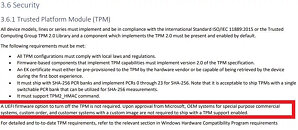- Joined
- Oct 9, 2007
- Messages
- 47,322 (7.52/day)
- Location
- Hyderabad, India
| System Name | RBMK-1000 |
|---|---|
| Processor | AMD Ryzen 7 5700G |
| Motherboard | ASUS ROG Strix B450-E Gaming |
| Cooling | DeepCool Gammax L240 V2 |
| Memory | 2x 8GB G.Skill Sniper X |
| Video Card(s) | Palit GeForce RTX 2080 SUPER GameRock |
| Storage | Western Digital Black NVMe 512GB |
| Display(s) | BenQ 1440p 60 Hz 27-inch |
| Case | Corsair Carbide 100R |
| Audio Device(s) | ASUS SupremeFX S1220A |
| Power Supply | Cooler Master MWE Gold 650W |
| Mouse | ASUS ROG Strix Impact |
| Keyboard | Gamdias Hermes E2 |
| Software | Windows 11 Pro |
Perhaps the most controversial system requirement of the upcoming Windows 11 operating system is the need for a hardware trusted platform module that meets TPM 2.0 specs. Most modern computers fulfill this requirement using fTPM (firmware TPM) solutions built into their processors; and those that don't, have TPM headers for add-on TPMs, which scalpers have their eye on. It turns out, that Microsoft is designing special variants of Windows 11 for special contracts Microsoft will execute.
Computers sold under the scheme will be marked "special purpose systems," and the Windows 11 version running them will do away with the TPM 2.0 requirement. These systems are very likely to be Government or Military; or perhaps even variants Microsoft exports to countries like China and Russia, which have their own specialized cybersecurity policies and dictate software to be written a certain way to be sold in the country.

View at TechPowerUp Main Site
Computers sold under the scheme will be marked "special purpose systems," and the Windows 11 version running them will do away with the TPM 2.0 requirement. These systems are very likely to be Government or Military; or perhaps even variants Microsoft exports to countries like China and Russia, which have their own specialized cybersecurity policies and dictate software to be written a certain way to be sold in the country.

View at TechPowerUp Main Site









